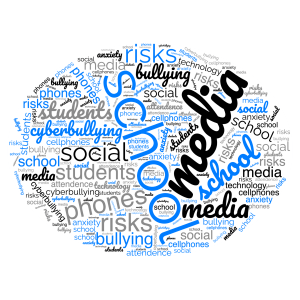
Image created by Bassey, A. using wordclouds.com
I believe there is space for social media in the lives of children and teenagers, but I do not think it belongs in a school. Cellphones can be fun, and provide entertainment for children, but there are serious mental health risks that come with them. According to NPR, “Young people who report spending the most time on smartphones — five to seven hours a day — are twice as likely to report being depressed as those who use their phones for one to two hours a day” (Kamenetz, 2019). The severe risks that come with extensive technology use are too powerful to ignore. What students do outside of the school is up to their parents and them, but in a school, there is no way to control what they are seeing and doing, and how it affects them.
Aside from the passive risks of social media causing depression and anxiety, it is also likely to introduce students to the world of cyberbullying. An example is Ronan Parke, the runner-up on Britain’s Got Talent. When exposed to the media at age, he began to be cyberbullied really bad by fans of the show. It got to the point that he had to get off social media and have a group of people run his accounts for him (Willett, 2019). He was one of the lucky ones, however. Many children who experience cyberbullying don’t have someone to turn to who can help or are afraid to seek it out, so they suffer in silence. It used to be that children who were bullied in school could get away from it at home, but now with social media, it can follow them. Cyberbullying can lead to less attendance, struggles with classwork and attention, and problems arising between students or even teachers (Likes vs. Learning: The Real Cost of Social Media for Schools, 2023) In some extreme cases, cyberbullying can lead to suicide.
While I see the argument that cell phones can bring students fun and calm them down, from personal experience, that is simply a disguise. In reality, cell phones and social media cause a dissociative effect, disconnecting their users from reality and forcing emotions to go blank, repressing them (McQuate, 2022). It’s not calming, it’s harmful. While there is a time and place for this, it is not in a school. It can be good for a brain break after school, or while winding down for the night, but during school, students should be focused and on top of their work, not floating in their own minds.
Resources
Kamenetz, A. (2019, August 27). NPR’s The Scientific Debate over Teens, Screens, and Mental Health. National Public Radio. Link
Likes vs. Learning: The Real Cost of Social Media for Schools. (2023). American Federation of Teachers. https://www.aft.org/sites/default/files/media/documents/2023/LikesVSLearning_Report.pdf
McQuate, S. (2022, May 23). “I don’t even remember what I read”: People enter a “dissociative state” when using social media. UW News. https://www.washington.edu/news/2022/05/23/people-enter-a-dissociative-state-when-using-social-media/
Willett, R. (Director). (2019). Plugged-In: The Toxicity of Social Media Revealed. [YouTube Video]. Brick in the Wall Media.
Hey Ann, I really enjoyed reading your blog post for this week. I also agree that social media does not belong in schools. In my opinion, I think that social media doesn’t have any purpose in a Childs life. A child should be nurtured and grow by experiencing things such as being outside, hanging out with friends and creating an active lifestyle that you can carry with you as you get older. I also agree that social media is a disguise used against children that can create disconnections and also bring upon other factors liked you mentioned, such as the passive risks that social media brings. Overall, I really enjoyed reading your blog!
Hey Ann, I really enjoyed reading you blog post about social media for this week. I have to say as a content creator someone who is constantly on social media I believe social media should be allowed in schools but monitored. Now if we are talking about children who are in elementary school then I would say it’s not necessary for them to be exposed to. But social media allows people to make new friends, it’s a source of income, and it’s a place where you can just express yourself. I do see you’re thoughts and concerns about social media being present in schools and how bullying is connected to the use of social media which is true. But taking away students freedom of expressing themselves isn’t the way to go. Maybe instead the consequences of bullying should become more harsh and serious instead. But overall I really enjoyed reading you’re post and getting to understand your thoughts and reasoning.
Hi Ann great job on your blog post this week! I found your opinion on social media in the classroom interesting because I had the opposite of yours. Mentioning the risks associated with social media and cyberbullying is a good point to bring up because kids who are affected by it often feel as if they cannot turn to anyone for help, causing a higher risk of anxiety and depression. You also mentioned how phones can be distracting in the classroom, preventing students from learning. I was wondering how you would combat this as a teacher and what methods you would bring into your classroom, from my experience in high school I remember there being phone “jails” in which we would place our phones in a pocket for the period, then being able to get it back at the end of class. I think that we as educators could teach our students how to use social media safely and responsibly, without having a total ban on phones in schools, which is an idea I would like to hear your perspective on.